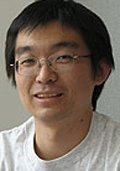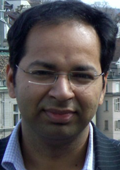ISQED 2016 Panel Discussion
Tuesday, March 15, 2016
12:35pm–1:45pm
Great America Ballroom
Hardware and System Security in IoT Era
Chair & Moderator:
Prof. Gang Qu - University of Maryland
Panelists:
Seetharam Narasimhan - Intel
Mark M. Tehranipoor - Florida Institute for Cybersecurity
Tom Katsioulas - Mentor Graphics
Michele D. Guel - Cisco Systems
Mohit Arora - NXP Semiconductors
Pim Tuyls - Intrinsic-ID
Summary: Hardware is the foundation of any security system. In recent years, a growing number of software-based security solutions have been migrated to hardware for enhanced resistance against software-based attacks. However, recent research has revealed that hardware is also subject to a number of security attacks. The emerging Internet-of-Things and Cyber-Physical Systems further demand achieving security for a complex system including software, hardware and firmware components against software, hardware and/or firmware-based attacks in a dynamic and possibly hostile environment under tight resource constraints. In this interactive session, a group of leading industry experts will explore the various opportunities and challenges that the security requirement brings to the semiconductor industry.
 Gang Qu
Gang Qu About Gang Qu
Gang Qu received his Ph.D. degree in computer science from the University of California, Los Angeles, in 2000. He is currently a professor in the Department of Electrical and Computer Engineering and Institute for Systems Research, University of Maryland at College Park. He is also a member of the Maryland Cybersecurity Center and the Maryland Energy Research Center. Dr. Qu is the director of Maryland Embedded Systems and Hardware Security (MeshSec) Lab and the Wireless Sensors Laboratory. His primary research interests are in the area of embedded systems and VLSI CAD with focus on low power system design and hardware related security and trust. He studies optimization and combinatorial problems and applies his theoretical discovery to applications in VLSI CAD, wireless sensor network, bioinformatics, and cybersecurity.
 Seetharam Narasimhan
Seetharam Narasimhan About Seetharam Narasimhan
Seetharam Narasimhan is a Lead Security Researcher at the Security Center of Excellence, Platform Engineering Group of Intel Corporation, Hillsboro, Oregon, USA. He obtained a Ph.D. in Computer Engineering from Case Western Reserve University (USA) in 2012 and a B.E. (Hons.) in Electronics and Telecommunication Engineering from Jadavpur University (India) in 2006. His research interests include: Hardware Security, Ultralow power and reliable nanoscale circuits, as well as Bio-medical circuits and systems. He is the co-author of three book chapters, and more than 40 publications in international journals and conferences of repute.
 Mark M. Tehranipoor
Mark M. TehranipoorAbout Mark M. Tehranipoor
Mark Tehranipoor is currently the Intel Charles E. Young Professor in Cybersecurity at the ECE Department, University of Florida. His current research interests include: hardware security and trust, counterfeit electronics detection and prevention, supply chain risk management, and reliable and testable circuit design. Dr. Tehranipoor has published over 250 journal articles and refereed conference papers and has given more than 150 invited talks and keynote addresses since 2006. He has published six books and ten book chapters. He is a recipient of several best paper awards as well as the 2008 IEEE Computer Society (CS) Meritorious Service Award, the 2012 IEEE CS Outstanding Contribution, the 2009 NSF CAREER Award, and the 2014 MURI award. His projects are sponsored by both the industry (Semiconductor Research Corporation (SRC), Texas Instruments, Freescale, Comcast, Honeywell, LSI, Avago, Mentor Graphics,R3Logic, Cisco, Qualcomm, MediaTeck, etc.) and Government (NSF, ARO, MDA, DOD, AFOSR, DOE, etc.). He serves on the program committee of more than a dozen leading conferences and workshops. He served as Program and General Chairs of several leading conferences and workshops. Prior to joining UF, Dr. Tehranipoor was the founding director of CHASE and CSI centers at the University of Connecticut. He co-founded a new symposium called IEEE International Symposium on Hardware-Oriented Security and Trust (HOST) and served as HOST-2008 and HOST-2009 General Chair. He is currently serving as HOST’s Chair of Steering Committee. He is also the co-founder of Trust-Hub (www.trust-hub.org). He served as an Associate EIC for IEEE Design & Test, an IEEE Distinguished Speaker, and an ACM Distinguished Speaker from 2010 to 2014. He is currently serving as an Associate Editor for JETTA, JOLPE, Transactions on VLSI (TVLSI), and Transactions on Design Automation for Electronic Systems (TODAES). Dr. Tehranipoor is a Senior Member and Golden Core Member of the IEEE and Member of ACM and ACM SIGDA.
 Tom Katsioulas
Tom KatsioulasAbout Tom Katsioulas
Tom Katsioulas is currently heading the market development ecosystem strategy for the Design for Security initiative at Mentor Graphics. Tom has several years’ experience in semiconductor, IP, EDA, embedded systems, and enterprise software applications. He has led or advised many startups in design methodology, analytics-driven process automation, industrial IoT, and enterprise software applications. Tom led corporate strategy at Forte Design Automation and founded AmmoCore Technology, where he invented its massively parallel physical design platform. He was also a methodology consultant at Synopsys, a marketing director at Cadence, and an applications engineer, chip designer, and CAD software developer at Digital Equipment Corporation. Tom holds an M.S. in Electrical Engineering and Computer Science from the University of Massachusetts (Amherst, MA) and a B.S. in Computer Engineering from the University of Bridgeport (Connecticut).
 Michele Guel
Michele GuelAbout Michele Guel
Michele’s passion is to inspire, lead and mentor people. She joined Cisco in March 1996 as the founding member of Cisco’s internal security team, which is now the Security and Trust Organization under John Stewart. During her 20 years at Cisco, she has had the opportunity to work on all facets of cybersecurity security. In 2010, Michele was promoted to Distinguished Engineer, one of 8 female DEs across Cisco. She recently co-founded the Cisco Women in Cybersecurity Community which has strong focus on expanding awareness about the numerous and exciting opportunities in the field of cybersecurity. Outside of Cisco, Michele has been an avid participant, speaker, teacher, influencer and evangelist in the cyber security industry for over 27 years. Her most recent work focuses on developing & codifying the practice and art of Information Security Engineering & Architecture, with an emphasis on cloud and IoT. Her motto is all about “Building it in and not bolting it on”.
 Mohit Arora
Mohit Arora About Mohit Arora
Mohit Arora is a Senior Design and Security Architect with NXP Semiconductors, Security and Connectivity business group and is located in Austin. Within NXP, he is responsible for architecture of i.MX low power family of application processors with "Embedded Security" as one of his main expertise. Previously as a system architect, he has been involved in definition and architecture for MCU/MPU based SoCs targeted for general purpose, smart metering and Point of Sale(PoS) market space. He is actively involved as “Industrial Liaison” in several SRC security research projects. He earned a Bachelor’s degree in Electronics and Communication Engineering from Netaji Subhas Institute of Technology (NSIT), India in 2000. He is also the author of the book "The Art of Hardware Architecture” and have more than 50 international publications and several patents in the field of embedded security.
 Pim Tuyls
Pim TuylsAbout Pim Tuyls
Dr. Pim Tuyls is one of the pioneers of the field of Physical Unclonable Functions and holds 50+ patents in this field. He started the scientific and technological work within Philips Research in the early 2000’s where he co-founded Intrinsic-ID. He has been a visiting professor at COSIC from 2004-2008. Pim is heading Intrinsic-ID the world-leader in Cyber Physical Security Systems, since 2010. Recently, he moved to Silicon Valley to accelerate its further growth.

